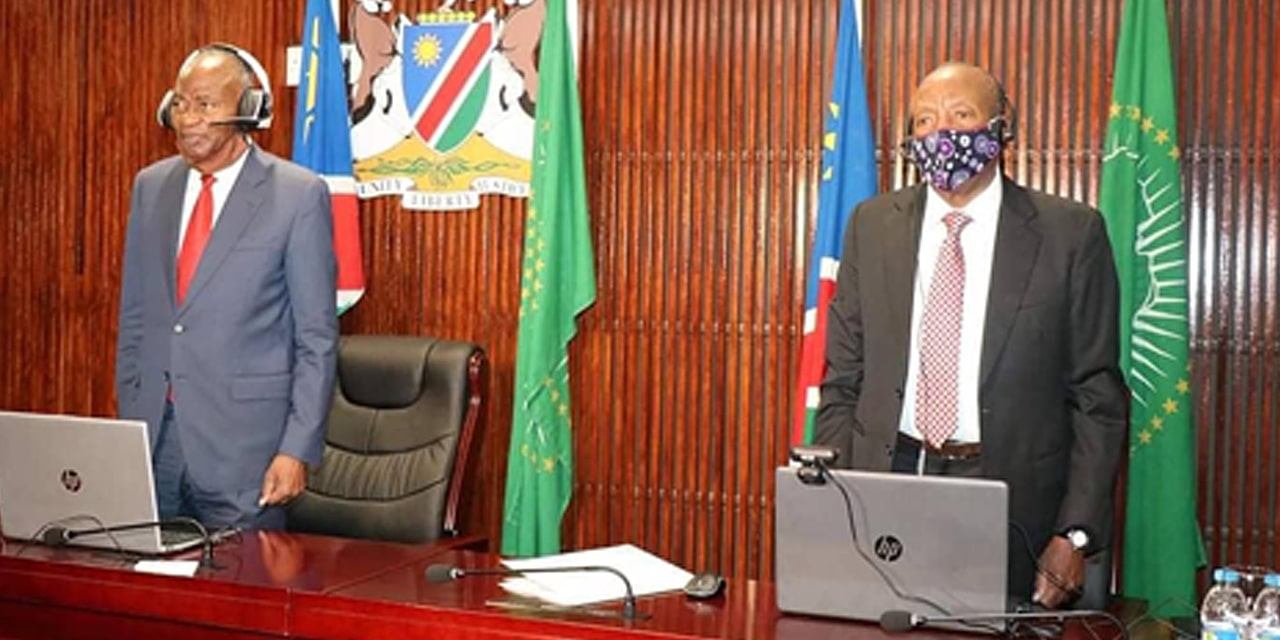Moses Magadza
WINDHOEK, NAMIBIA – Namibia’s Vice President Nangolo Mbumba has said that the ongoing COVID-19 is “a wakeup call” and the SADC Region’s Members of Parliament must adapt to the new norm.
He made the remarks when he officially opened the virtual 47th Plenary Assembly Session of the SADC Parliamentary Forum on Friday.
“It is evident, that COVID-19 pandemic is a wakeup call to all of us – Governments, Parliaments and the citizenry all over the world. In the rude rush to respond to the novel pandemic, in some instances, responses were knee-jerk and suffered from experimentation,” the VP said.
He said the evolving pandemic is “a clear illustration of the unexpected crises that can happen and even reoccur” and called on SADC MPs to ensure high levels of accountability.
“Now, more than ever before, the need for accountability from all of us is of paramount importance. Accountability is the hallmark of democracy. This is true whether there is a pandemic or not. Accountability should not be a seasonal or occasional thing; it has to be a way of life.”
He called for a review of the adequacy of national and regional natural disaster or emergency laws with a view to improving them in the face of lessons learned from Covid-19.
VP Mbumba called for people and institutions to be proactive in developing coordinated responses in disaster risk management. He warned that corruption could increase during a crisis and urged MPs to remain vigilant.
“An emergency like Covid -19 can be a driver for corruption. Parliaments must put in place mechanisms for monitoring and evaluation and auditing resources that have been secured in the name of responding to this pandemic. Oversight bodies need to be empowered through Acts of Parliament so they do not just exist in name.”
Turning to the theme of the 47th Plenary Assembly Session: “The role of Parliaments in strengthening accountability during a pandemic: The case of Covid-19”, he said it was apt and timely.
He said: “It has been a little over six months since SADC Member States began introducing different measures to respond to the spread of COVID-19. This Plenary is a welcome opportunity for SADC Member Parliaments and stakeholders to engage in frank discussions on the impact and consequences this disease has on our region.”
He said COVID-19 had been instructive.
“This pandemic has taught us many lessons. We have learnt how a pandemic can severely impact any national economy. It has become apparent that countries which heavily rely on imported goods and services, can be extremely affected by the closure of borders during a pandemic like COVID-19.”
Additionally, he said, the pandemic had resulted in massive job losses, disrupted supply chains, led to food insecurity, increased levels of poverty and in some cases, civil strife.
“Overall, the COVID-19 pandemic has rendered some citizens more vulnerable and having only to rely on social safety net interventions.”
On the role of Parliaments, VP Mbumba said: “Parliaments have a responsibility to ensure that our local institutions – regardless of whether they are private or public – are fully supported to make their host countries self-sufficient. The localization and regionalisation of supply chains should become a priority for all our countries.”
He said the trans-boundary nature of pandemics such as COVID-19, makes it imperative for SADC Member States to strengthen harmonization of national borders.
“This will enable us to collectively contain disasters while at the same time facilitating the unhindered movement of essential goods, services and citizens.”
He advocated for a coordinated and harmonized regional approach to testing, tracing, treating and procuring of drugs, joining global efforts to develop vaccines and other medicines.
Noting that no much was known on COVID-19, he called for investment in research, development and testing for COVID-19 and other communicable diseases with national Parliaments sufficiently funding such efforts.
The VP, who is a former Minister of Information and Broadcasting, challenged the region’s MPs to facilitate sharing of evidence-backed information.
“Public trust can very quickly be eroded if inaccurate information is sent out. With the era of social media upon us, fake news has been circulating during this pandemic. This included unscientific claims on how we can prevent or cure COVID-19,” he noted.
He commended the SADC PF for developing Model laws on critical issues that include the eradication of child marriages, democratic elections and gender-based violence.
“Such Model Laws serve as useful guides in promoting the harmonization of legal frameworks and facilitating introduction of international instruments in our Member States.”




